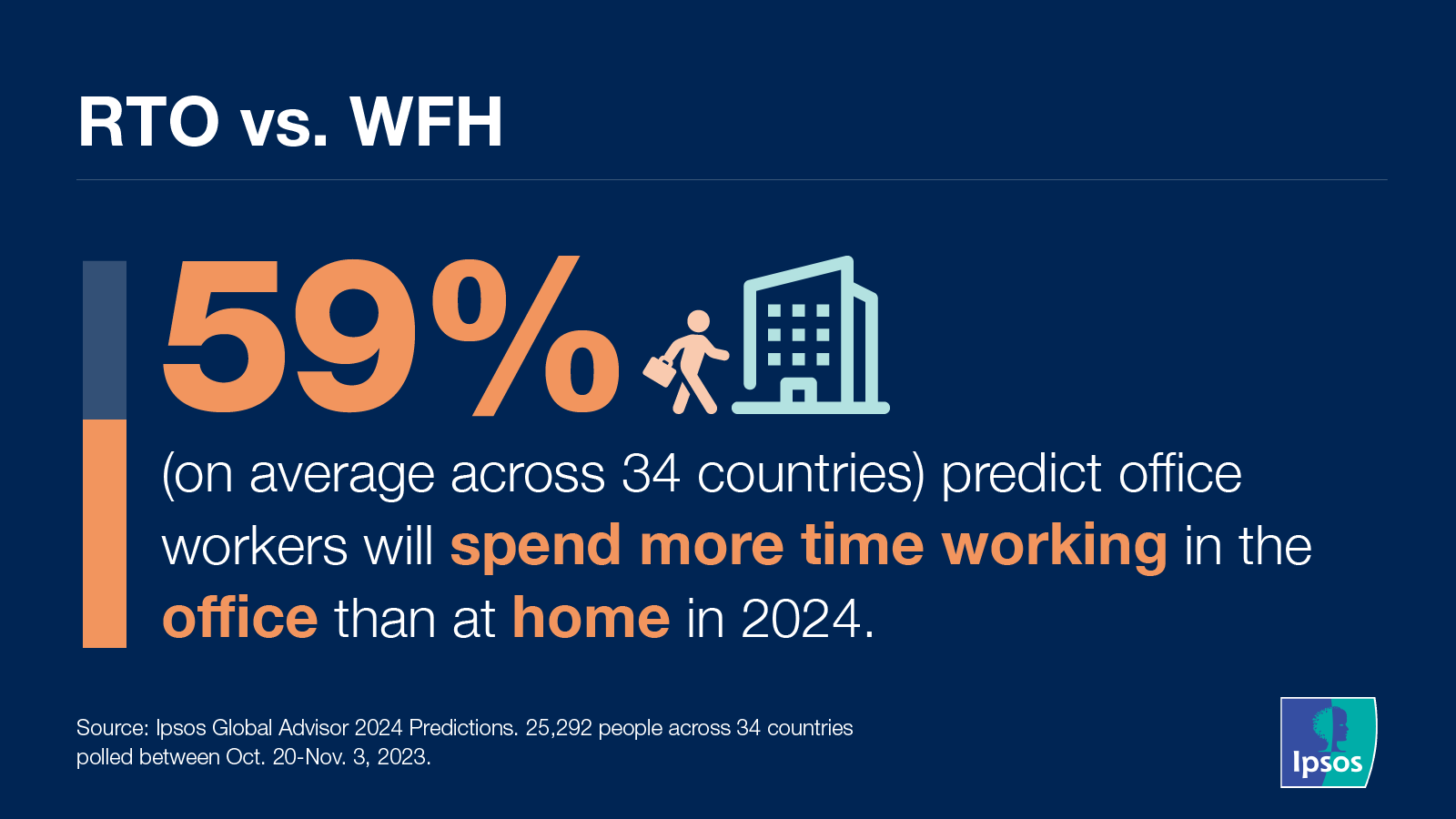

Data Dive: Mixed forecast for 2024 as optimism rises for year ahead while nerves about inflation remain
Hope springs eternal… to a point.
On the one hand 70%, on average globally, are optimistic for the year ahead, but on the other hand people remain pessimistic that soaring inflation is really coming back down to Earth.
People in South Africa are feeling particularly glum about job growth with 84% predicting unemployment in their country will be higher in 2024 versus 2023.
"The economic situation in the country is dire", says Mari Harris, Knowledge Director for Ipsos Public Affairs in South Africa. Indeed, the overall unemployment rate is hovering around 30% and among young people is above 60%.
Concern about jobs, unfortunately, is nothing new for South Africans with almost two in three (63%) considering unemployment a top issue for their country in January 2024.
Later this year, South Africans will head to the polls to elect national and political leaders but Harris says there’s not much faith in the democratic system. "Widespread prevalent opinions are that politicians only care about themselves and feather their own nests and do not care about the electorate".
Despite low expectations for the elections and employment prospects, 79% of South Africans predict this year will be better than the last.
In South Africa and beyond Ipsos Global Advisor’s annual predictions polling across 34 countries finds there’s a mix of hope and trepidation about what could be in store for 2024.
How was it for you?
The decade kicked off with lockdowns, mass layoffs and stockpiling of face masks, hand sanitizer and, er, toilet paper. Unsurprisingly, 2020 was seen by 90%, on average globally, as a bad year for their country and 70% said the first year of the COVID-19 pandemic was bad for them and their family.Since then the proportion saying the year was bad for their country has ticked down to 77% in 2021, 73% in 2022 and 70% in 2023. That’s a vast improvement from the first year of the pandemic but it’s still higher than 2019 when 65% said it was a bad year for their country.
The proportion saying the year was bad for them personally has also been falling, down to 58% in 2021, 56% in 2022 and 53% in 2023. But the proportion of people having a bad year remains slightly higher than pre-pandemic when 50% said 2019 was bad for them personally.
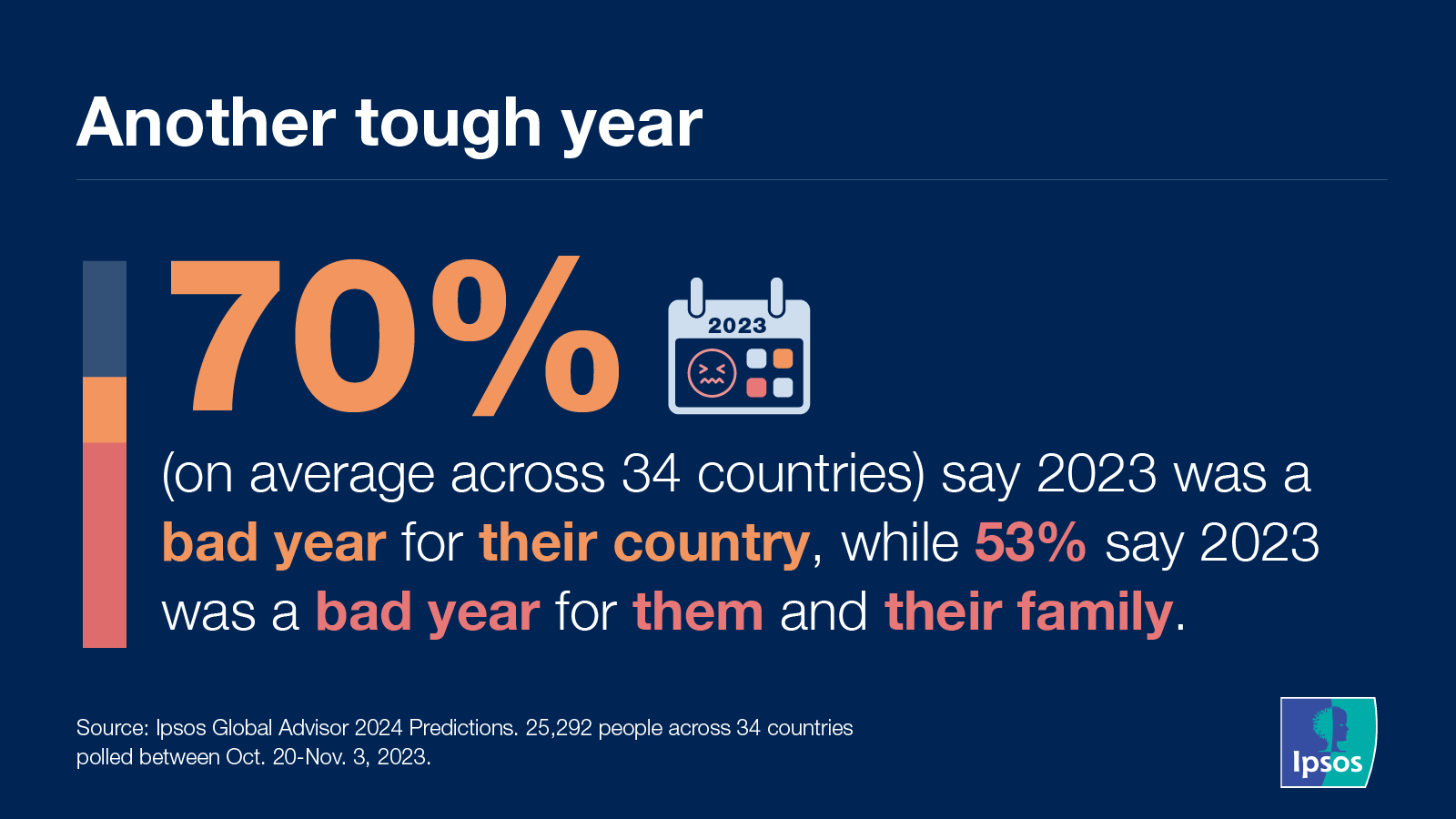
This year has to be better than the last, right?
With the global health emergency now in the rearview mirror people are predicting brighter days ahead.Despite the troubles of 2023 optimism rose five percentage points year over year with 70% predicting 2024 will be better. While up, that’s seven points behind late 2019 when 77% very wrongly predicted 2020 would be a better year than the last.
The pain of the past few years hasn’t been inflicted equally. Case in point: Argentina’s annual inflation rate was an eye-watering 211.4% in 2023. The cost of living there remains staggeringly high and yet 69% of Argentinians predict 2024 will be a better year.
“I think that as Argentinians, we’ve learned how to live in chaos. We’ve learned how to live in this weird economy and doing all this, you know, thinking out of the box,” says Carolina Smart, Service Line Director for Ipsos Public Affairs in Argentina. “The other day, I was talking to somebody saying, you know, there’s no box in Argentina anymore.”
Another reason for hope is voters recently elected a very outside-of-the-box thinker, Argentine President Javier Milei and people are feeling a change will do the country good. In the wake of the election the proportion of Argentines saying their country is heading in the right direction soared to 66% in January 2024, well up from just 8% who said the same in May 2023 pre-election. Though, recent protests have shown while many are optimistic others are outraged about the cuts President Milei plans to make.
Voters, in particular young and lower-income people, are hopeful new leadership can “bring back order” and “the optimism right now is because they actually think that this person is going to do something,” says Smart.
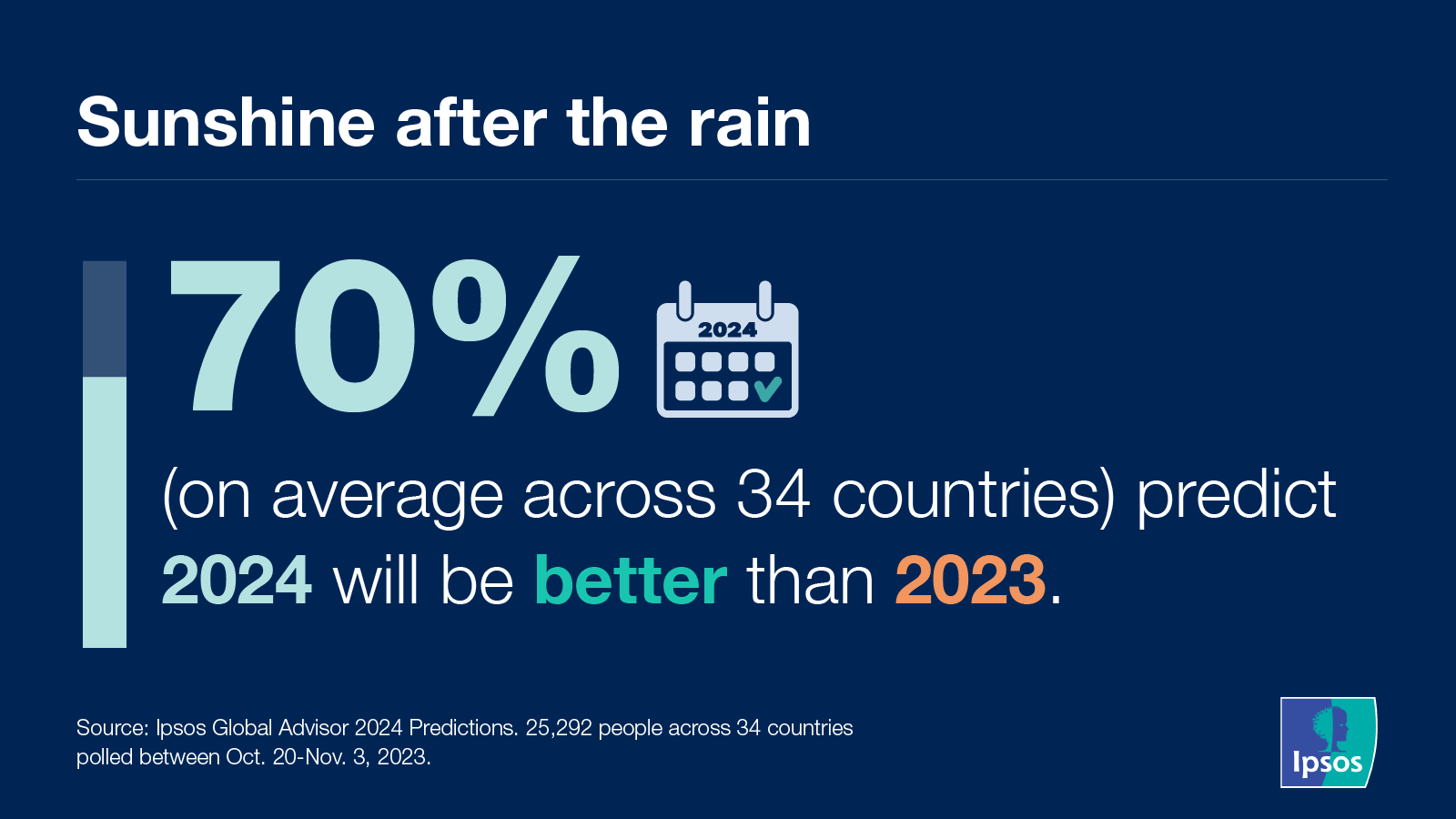
What goes up must come down?
People in Argentina and beyond, though, aren’t feeling as sunny about high prices in 2024.Shortly before the pandemic was officially declared inflation was a top concern for a mere 11%, on average globally, back in January 2020. Worry about red-hot prices soared to an all-time high of 43% in February 2023 before cooling a bit, sitting at 36% in January 2024.
As the price of pretty much everything ticked higher than salary raises over the past few years workers around the globe have increasingly found their hard-earned paycheques aren’t stretching as far as they once did.
Given the widening wage-price gap it’s little surprise close to nine in 10 (85% on average across 34 countries) predict prices in their country will rise faster than people’s incomes in 2024. Strong majorities also predict inflation (70%), interest rates (70%) and unemployment (68%) will be higher this year vs. last year.
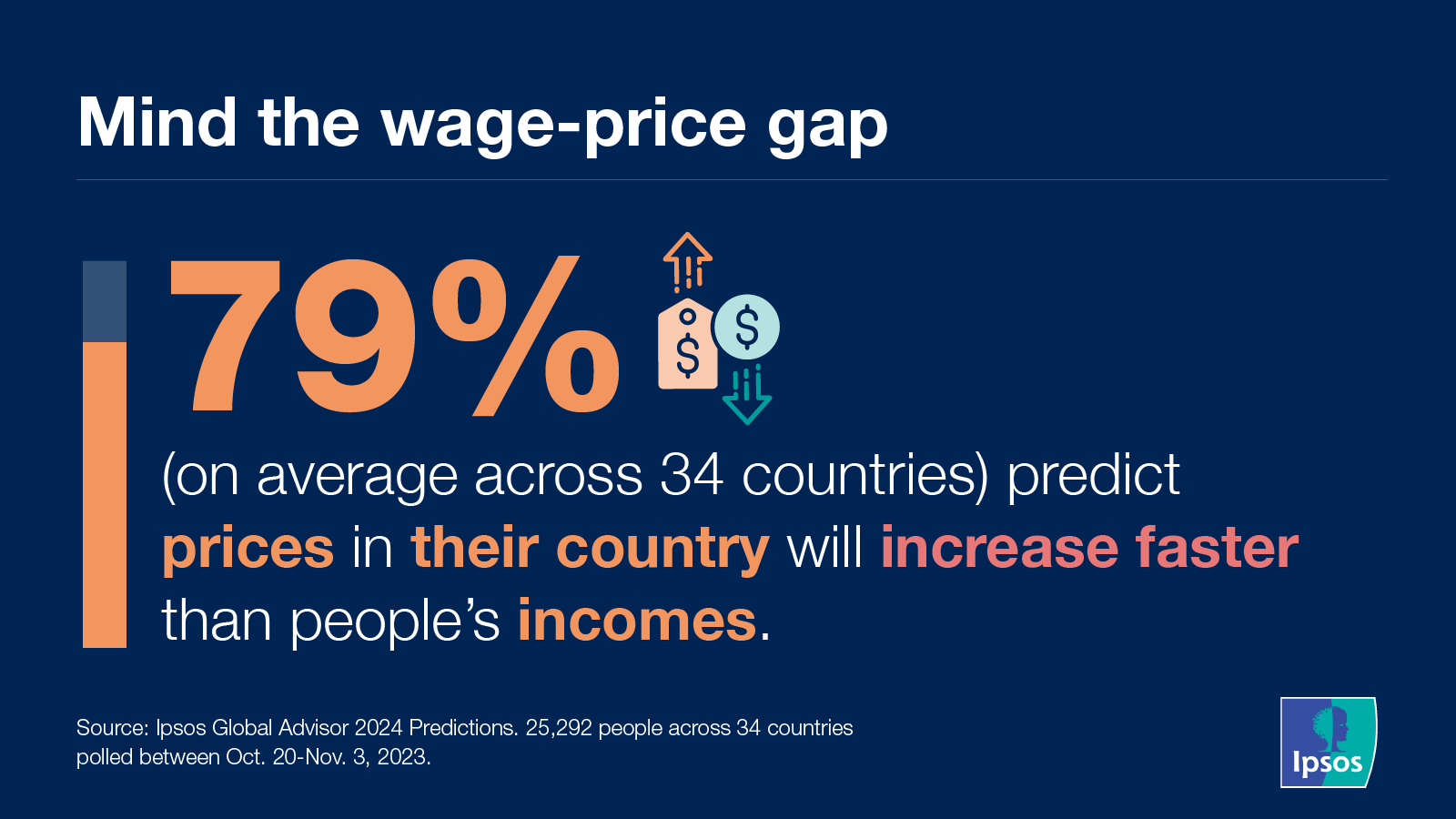
It’s what temperature?!
There were more than a few things distracting all of us in the first years of the 2020s, but it became hard to ignore climate change anymore.Abnormal fires, floods and storms started to seem like the norm.
And it’s been difficult to not literally and figuratively sweat the heat. 2022 smashed temperature records, then in 2023 more records fell. Yet, with everything else going on in the world climate change was seen as a top concern for only 16%, on average globally, in January 2024.
Even if climate change isn’t viewed as a leading topic it’s always lurking in the background with just over four in five (81% on average globally) predicting global temperatures will rise again this year.
Italians, like scores of others, have seen and felt the impacts of scorching summers and ferocious floods.
“We saw Ravenna under water in May 2023, Livorno last November, it is not difficult to imagine Florence, Bologna or Milan grappling with similar disasters,” says Chiara Ferrari, Service Line Leader for Ipsos Public Affairs in Italy.
So it’s little surprise 80% of Italians predict global temperatures will continue to tick up, 71% think there’ll be more will be more extreme weather events in their country and 51% predict a natural disaster will hit a major city in Italy in 2024.
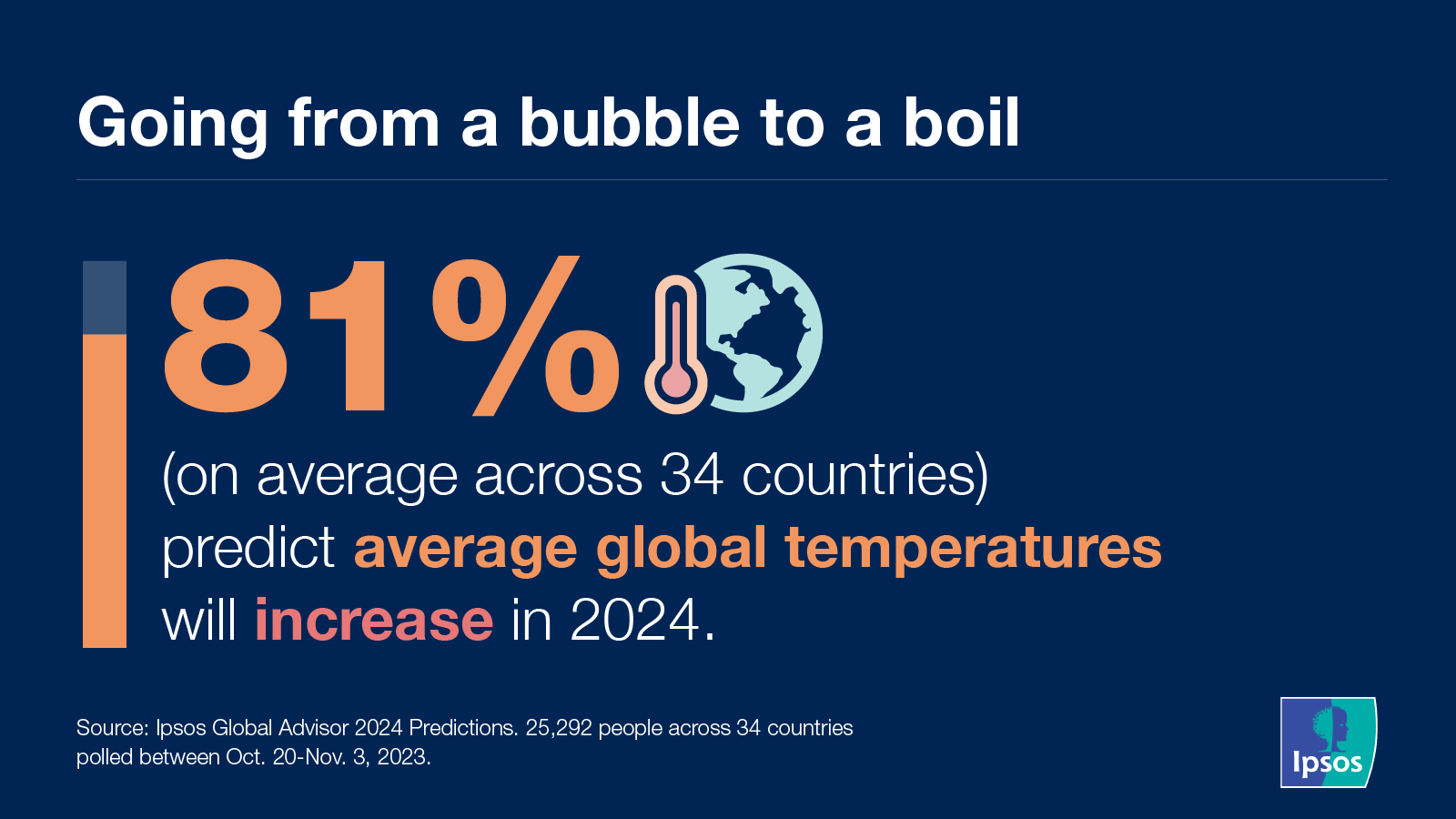
The new (old) normal?
Lockdowns at the start of this decade meant many knowledge workers around the globe abruptly stopped commuting to an office as their formal wear collected dust in the closet.By mid-2021, white-collar workers were split on where they wanted to work post-pandemic, with 25% (on average across 29 countries) saying they wanted to spend zero days in the office and 25% saying they wanted to spend five days per week, the remaining 50% of respondents wanted to work somewhere between one to four days in the office and the rest of the time at home.
Clearly some loved working from home (WFH), while others couldn’t wait to return to the office (RTO).
With social distancing rules now a vestige of another era the majority in 30 of 34 countries predict office workers will spend more time working in the office than at home in 2024. Meaning sadly, or thankfully depending on your perspective, it’s likely time to get that structured suit out of the closet and leave the soft yoga pants for, um, yoga.
